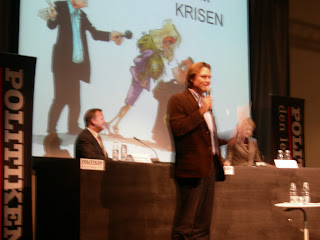 What do Helle Thorning-Schmidt (S) and Lars Løkke Rasmussen (V) have in common? Waiting to become prime minister of Denmark. Although tonight they stressed that this was not an election event. The first is the opposition leader from The Social Democrats - the second the current minister of finance from The Liberal Party of Denmark. They met for a debate on the financial crisis, arranged by the newspaper of Politiken and hosted by political editor Peter Mogensen. With a turnout of about 300 people, mainly subscribers of the newspaper.
What do Helle Thorning-Schmidt (S) and Lars Løkke Rasmussen (V) have in common? Waiting to become prime minister of Denmark. Although tonight they stressed that this was not an election event. The first is the opposition leader from The Social Democrats - the second the current minister of finance from The Liberal Party of Denmark. They met for a debate on the financial crisis, arranged by the newspaper of Politiken and hosted by political editor Peter Mogensen. With a turnout of about 300 people, mainly subscribers of the newspaper.The two politicians often clash, latest at this year's budget negociations for 2009. The arguments were mostly the same on both sides. Dynamic effects versus tax reliefs. They go something like this: Ms. Thorning-Schmidt (S) lashed out at the sitting government for not initiating investments in public institutions, green energy, and public transportation to create growth - and for giving tax reliefs to the well-of, whenever growth has been made. On his part, Mr. Løkke Rasmussen (V) argued for growth created by lowering interest rates to fuel private enterprise, giving tax reliefs to the well-of, because they boost the economy and create more jobs - thus creating 'dynamic effects'. The constantly debated economic paradox.
'When the financial experts and the minister of finance calculate this, they don't take the financial and bank crises into account. This will reinforce the unemployment. So we are more pessimistic. What will the government do about this?,' the opposition leader argued and asked.
'The honest answer is, that this government has diminished the unemployment to an historically low level. The interest rate is one and three-quarters higher than in Europe. When this difference increases, it is necessary to conduct a policy to bring it down,' the minister of finance responded. Admitting to an expected rise in the unemployment level from 2009 to 2010, yet unwilling to give an estimate of that level - or what level would be an 'acceptable' effect.
Not satisfied with deviant responses, the opposition leader wished for another minister of finance.
'But I will rather wait to name another minister of finance until I can appoint one myself,' she wittingly responded, harvesting laughs. And asked that prime minister Anders Fogh Rasmussen would join negociations instead of Lars Løkke Rasmussen, whose style of negociation she often criticises.
The minister of finance then suggested that she should appoint other financial experts at the same time, if she wants backing for her policy. Inviting the inevitable clap trap and turning the debate into a show case.
As a silver lining, they did both agree on furthering investments in green energy and infrastructure. So hopefully they will meet again. With or without the prime minister. For a dynamic debate or comic relief.
For a more elaborate overview of the political scene in Denmark, please see:
http://paradoxicalnews.blogspot.com/2008/10/cliff-notes-to-danish-politics.html